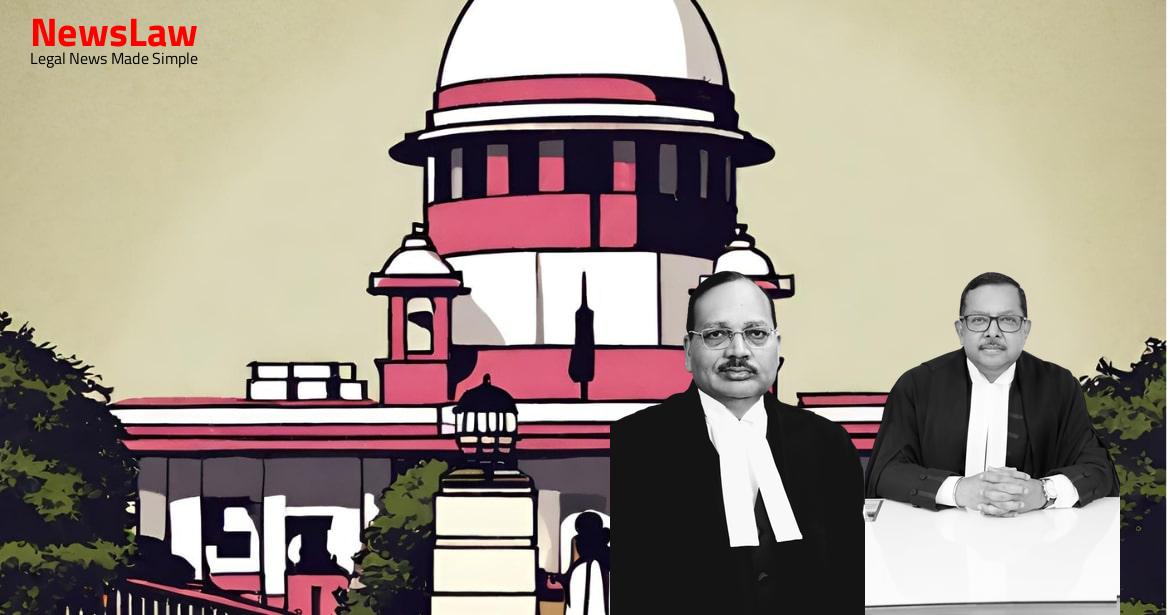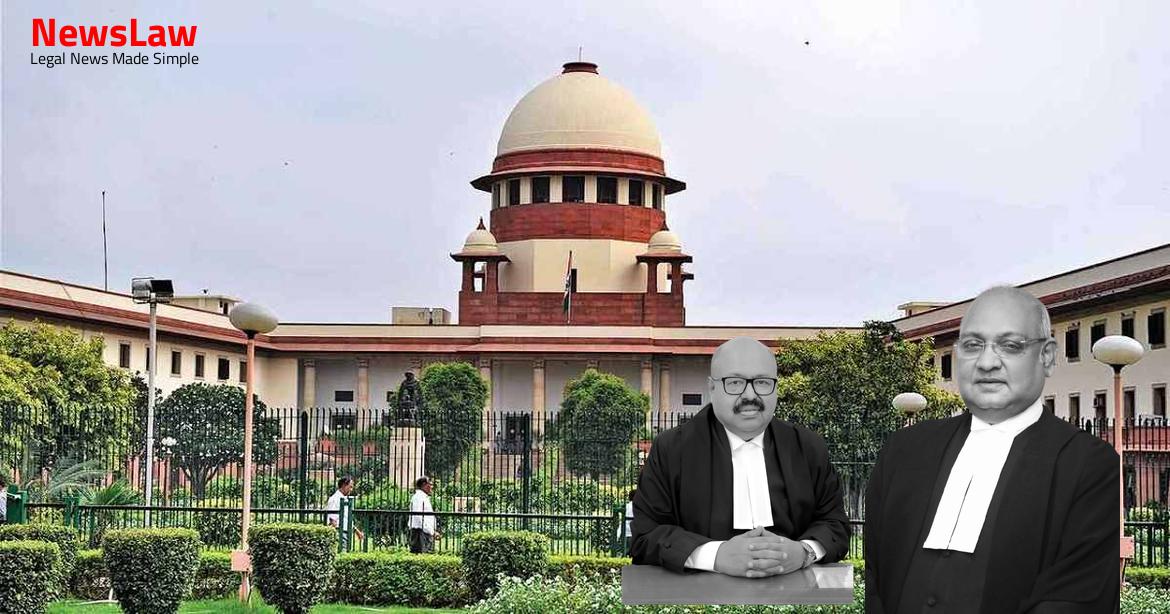In a significant ruling by the Supreme Court of India, a judgment on tender cancellation underscores the principles of fairness and public interest in contractual matters. The case involves a dispute between parties regarding the cancellation of a tender, with implications for contractual obligations and administrative decisions. Stay tuned to explore how the court’s decision impacts the legal landscape and upholds the values of fairness and public interest.
Facts
- The High Court observed an ambiguity in the Special Terms & Conditions of the Memorandum of Tender regarding signboard placement.
- The ambiguity led to conflicting interpretations in clauses 10 and 14 of the tender.
- The High Court deemed this ambiguity a technical fault, leading to the tender cancellation by the respondent.
- The cancellation notice of 07.02.2023 cited technical faults in the tender as the reason, eliminating the element of arbitrariness.
- The decision to cancel the tender was deemed non-arbitrary by the Single Judge, citing prior notice to the appellant and lack of ulterior motives.
- The appellant’s appeal in M.A.T. No 744 of 2023 was dismissed by a Division Bench, affirming the Single Judge’s decision.
- The cancellation was attributed to administrative exigencies and a change in policy for administrative convenience.
- The appellant submitted bids for maintenance work of two underpasses with quotations for each underpass.
- A notice was issued to stop all work on the underpasses due to maintenance handover from KMDA to KMC.
- The tender process was found to have technical faults and was subsequently cancelled.
- The appellant contested the cancellation based on the custody and revenue rights remaining with KMDA.
- Despite the appellant’s letter referring to the Order dated 01.12.2022, the tender was cancelled due to ambiguity.
- The cancellation notice stated financial losses as the reason for cancellation and offered reimbursement of costs incurred by the appellant.
- The appellant was declared the successful bidder, and work orders were issued based on the accepted quotations and terms.
- A memorandum of tender outlined the scope of work including maintenance tasks for the underpasses.
- Special Terms & Conditions allowed for contract termination in case of non-compliance by the successful bidder.
- A government order on 01.12.2022 directed the maintenance handover of E.M. Bypass and underpasses from KMDA to KMC.
Also Read: Arbitration Dispute Resolution: Key Ruling by the Supreme Court of India
Issue
- The two pivotal questions for consideration are: whether the action could be termed as arbitrary or unfair and in violation of Article 14 of the Constitution of India, and whether the action of cancelling the tender was amenable to the writ jurisdiction of the High Court.
- The scope of judicial review in contract/tender disputes involves checking for ulterior motives or irrelevant considerations influencing the decision.
- The court should respect administrative expertise and discretion while preventing arbitrary actions.
Also Read: Case of Promotion Policy: Ravikumar Dhansukhlal Maheta vs. High Court Of Gujarat
Arguments
- The petitioner argues that the cancellation of the tender was arbitrary, unreasonable, and influenced by malafide and extraneous considerations.
- The respondent contends that the cancellation was due to technical faults in the tender, specifically its non-specific and ambiguous nature.
- The respondent claims that the decision to cancel the tender was taken in good faith, considering the need to rectify technical faults and potentially increase revenue by correcting ambiguities.
- Both parties present contrasting views on the reasons behind the tender cancellation, with the petitioner alleging arbitrariness and the respondent citing technical faults and policy changes.
- The decision to cancel the tender was made in public interest and based on a change in policy.
- The file notings maintained by the respondent cannot be relied upon as they are internal deliberations.
- The decision to cancel the tender was to enable the respondent to float separate tenders for maintenance of the underpasses and licensing advertising rights.
- The operation, maintenance, and licensing rights for the advertisements have been taken over by a third party during the pendency of the appeal, rendering the appeal infructuous.
Also Read: State of India vs. Anees : Upholding the Conviction for Murder
Analysis
- The judgment discusses the scope of judicial review in matters related to contracts and tenders under writ jurisdiction.
- It emphasizes the importance of fairness and non-arbitrariness in State actions, even in contractual matters.
- The distinction between public law and private law elements in contracts with the State is highlighted.
- The analysis includes the examination of internal file-notings and deliberations of the State for judicial review.
- The concept of public interest in administrative decisions and the need for a balance between administrative discretion and fairness is discussed.
- Instances of termination or breach of contract by the State are examined from a legal standpoint.
- The need to uphold the sanctity of tenders in public-private procurement processes is underscored.
- The obligation of the State to act fairly and justly, even in contractual dealings, is reiterated.
- The impact of State actions on public interest and the requirement for actions to be grounded in real public interest are discussed.
- The judgment also addresses the concept of arbitrariness in State actions in contractual disputes.
- The Notice of Cancellation dated 07.02.2023 is held to be non-est.
- Issuance of a fresh tender to any third-party for the same work will not defeat the vested rights of the appellant.
- The appellant can seek civil remedies for redress, including damages for breach of contractual terms.
- Appellant has erected multiple structures at different sites for displaying advertisements at a significant personal cost.
- The handing over of operation and maintenance of the E.M. Bypass to the KMC does not affect the vested rights of the appellant.
- The appellant has made significant investments as per the terms of the tender.
- The court emphasized the importance of preventing the abuse of power by the State and maintaining public confidence in the administrative process.
- Judicial review of contractual disputes involving the State or its instrumentalities has evolved to ensure fairness, reasonableness, and adherence to public interest.
- Actions of the State in contractual matters should conform to rational, non-discriminatory standards to uphold Article 14 of the Constitution.
- The sanctity of public tenders lies in providing a fair playing field for all bidders, fostering competition, transparency, and preventing corruption.
- Contracts entered into by the State must be governed by reason, good faith, and public interest, not whims or caprices.
- Courts have a duty to protect the sanctity of contracts and tenders, ensuring that they are not arbitrarily terminated, leading to uncertainty and discouragement of public participation.
- The role of judicial oversight is crucial in upholding the principles of equal opportunity, fairness, and efficiency in governmental procurement processes.
- Justness, fairness, and reasonableness are the touchstones for reviewing State actions in contractual matters, aligning with the principles of good administration and non-arbitrariness.
- Merely noting in official files of the Government regarding any matter pertaining to a person is internal and carries no legal sanctity.
- Decision on the issue must be approved by competent authority and communicated to the person concerned by the State Government.
- Noting in internal deliberation does not create any right or legal order for the person concerned to claim benefits.
- After entering into a contract with the State, various circumstances may arise giving cause of action to seek relief through a Writ Petition.
Decision
- The order dated 16.09.2023 transferred operation and maintenance of underpasses to KMC from KMDA.
- This transfer of authority does not affect rights accrued in favor of the appellant.
- The appeal succeeds and the cancellation notice dated 07.02.2023 is quashed.
- The High Court’s judgment and order are set aside.
- The appellant is before the Court with the present appeal.
Case Title: SUBODH KUMAR SINGH RATHOUR Vs. THE CHIEF EXECUTIVE OFFICER (2024 INSC 486)
Case Number: C.A. No.-006741-006741 – 2024



